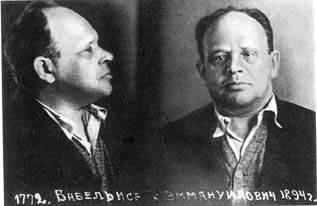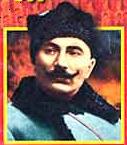 Babel, Isaak Emmanuelovich. Born 13 July (1 July, Old Style) 1894 in Odessa in a merchant's family. He attended the Odessa Commercial Academy, where he particularly excelled in the study of French. At the age of 15, he started to write stories in French. But school was more than studies. Babel wrote:
Babel, Isaak Emmanuelovich. Born 13 July (1 July, Old Style) 1894 in Odessa in a merchant's family. He attended the Odessa Commercial Academy, where he particularly excelled in the study of French. At the age of 15, he started to write stories in French. But school was more than studies. Babel wrote:
"The school was gay, rowdy, noisy and multilingual. There the sons of foreign merchants, the children of Jewish brokers, Poles from noble families, Old Believers and many billiard-players of advanced years were taught. Between classes we used to go off to the jetty at the port, to Greek coffee houses to play billiards, or to the Moldavanka to drink cheap Bessarabian wine in the taverns."At age 15, Babel demonstrated a few idealistic tendencies. He joined a Jewish welfare organization that worked among the poor, and he spent a whole year reading almost nothing but Tolstoy. It was through Tolstoy's works, Babel said, that he "came to understand all the sublime virtue of the Russian people." In 1911, Babel was sent by his father to study at the Institute of Financial and Business Studies in Kiev. It was here, at age 16, that Babel met Eugenia Gronfein, daughter of a importer and manufacturer of agricultural machines, who was to become his wife three years later. Eugenia was a girl of cultural refinement who was planning a career as an artist. It was during this time in Kiev that Babel has his first story published in a Russian-language bimonthly. After graduation in 1915 Babel went to Petersburg, having decided to establish himself as a writer. He took his writings around to the various editorial offices and met up with Gorky, who published two of Babel's works in 1916. The literary milieu surrouding Gorky at the time, immediately took note of the new writer. Viktor Sklovsky writes: Everyone noticed Babel's story and remembered it. They now took note of Babel, too. Middle height, high forehead, big head, an unwriterly face, dressed in dark clothes, talks entertainingly.Babel also did some work for the newspaper Journal of Journals. Gorky became a teacher and mentor for Babel and advised him to go out among the people for a while. Accepting Gorky's suggestion, Babel gave up writing and undertook various professions. In October 1917 he enlisted in the Red Army and served on the Rumanian front. In 1918, after contracting malaria, he was sent to Odessa for a while, but he was back in Petrograd by March 1918, working for Gorky's paper Novaya Zhizn. During this time Babel also claimed that he worked in the Cheka, in the Commissariat of Education, and took part in expeditions to the countryside to collect food for the cities. In 1919, Babel married Eugenie and moved back to Odessa, taking a job as editor in the Ukrainian State Publishing House. But his domestic routine was soon interrupted. In 1920 he was given a false name--Kiril Vassilevich Liutov--and sent as a reporter to Budenny's First Cavalry. There, he wrote upbeat, inspirational pieces for the Divisional newspaper, The Red Cavalryman. But all the time, Babel the writer was soaking in impressions and keeping diaries. In a letter, he described his life in the Cavalry: For whole days we travel from one brigade to another, observe the fighting, write summaries of operations, spend the nights in the woods, run away from airplanes which bomb us. The charming sky is above us, the sun is not hot, the pines sigh around us, hundreds of steppe horses whinny, oh, to live here, but our thoughts are trained upon murder. My words sound stupid, but this war really is, though sometimes beautiful, in every way injurious.In poor health after the ordeals of the campaign, Babel returned to Odessa. According to Konstantin Paustovsky, Babel was already a celebrated literary figure in Odessa, seen as the "first real Soviet writer", although he was still largely unknown on the national scene. At first, he and his wife lived with Babel's parents, but then Babel moved to the Caucasus where he worked as a correspondent for the Tiflis newspaper Dawn of the East and wrote and rewrote the stories that were to be part of his Red Cavalry series. Babel finally achieved the quality he was searching for in 1923, when, he says, he learned how to express himself clearly and succinctly. And so, he moved to Zagorsk, outside of Moscow, and in early 1924 the stories Sol' ("Salt"), Pismo ("The Letter"), Korol ("King") and Smert Dolgushova ("The Death of Dolgushov") appeared in volume four of Mayakovsky's magazine LEF. The stories rocketed Babel to national attention. Fedin wrote to Gorky: Babel is creating an uproar in Moscow. This fellow was in the cavalry for a long time and when he came back, he rained down a whole trunkful of manuscripts on the Moscow editorial offices and nearly drowned them. Everyone is ecstatic about him.
I demand protection from irresponsible slander for people who have been covered with the "artistic" spittle of class hatred by the literary degenerate Babel.Meetings and discussions sprang up to discuss Babel and his work. In conversation with Dmitri Furmanov, who was to edit the Red Cavalry collection for the State Publishing house, Babel defended himself: I gave what I saw with Budenny. I see that I didn't touch on the political work, that there's a great deal in general about the Red Army that I didn't touch on. I'll get to that, if I'm able, later. But for me that part doesn't come out to be as solid as the part I've done. Obviously, everyone has his own thing.One might also note that while in the Red Cavalry stories Babel chose to protray the senseless horror of war in stark, frightening, realistic terms, in his Odessa stories he chose to gloss over the atrocities of gangster Benya Krik, presenting the thug, murderer, extortionist, and arsonist in a flatteringly, almost loving, light. Babel continued to work on his Red Cavalry stories, but his health took a turn for the worse, and in early 1925, he went down to the Caucasus for a rest, which seems to have restored him. He returned to Moscow, but never s eems to have enjoyed the busy literary world there. He wrote to his sister (who had married and moved abroad): Like everyone in my profession, I am oppressed by the prevailing conditions of our work in Moscow; that is, we are seething in a sickening professional environment devoid of art or creative freedom.To make money, Babel undertook to write film scenarios as well as translations of French and Hebrew works. In November 1925, Babel's wife got a travel visa and went to Paris. The supposed reason for the trip was to study art, but it may also have been partly in response to the fact that Babel was having an affair with another woman. This left Babel alone in Moscow with his mother to care for, a responsibility which he was eager to shed. So, in 1926, he packed his mother off to his sister in Belgium. This seems to have freed Babel up to produce the play Zakat ("Sunset") (1926) and finally finish his seemingly endless corrections to the Red Cavalry stories, which were published as a collection at the end of 1926. In August 1927, Babel was able to end what he called "the horrible Moscow period of my life that has been so painful to me" and take flight to Eugenia, his wife, in Paris. He wanted to travel to Italy to meet with Gorky, but the Italians wouldn't let him in the country. In September 1928, Babel was back in the Soviet Union. He hoped to return to France the next year, particularly since his wife was pregnant. But a controversy concerning an interview he gave to Polish poet Alexander Dan intervened. Dan attributed various anti-Soviet statements to Babel, which Babel denied ever making. It took Babel until 1930 to clear his name with Soviet authorities. In the meantime, Babel was traveling again through the Ukraine and southern Russia. In June 1930, in order to get some peace and quiet for his writing, he took a job as a secretary for the village soviet in Molodenovo, about thirty miles outside Moscow. He published a number of stories in 1931 and 1932, including the collection of his Odesskiye Rasskazy ("Odessa Stories"), which have to do mainly with the society of Jewish gangsters in pre-Revolutionary Odessa. And much to Babel's vexation, the controversy over the Red Cavlary stories flared up again. Gorky came to Babel's defense and compared the work to Gogol's Taras Bulba. Stalin himself ended the matter, coming down on Babel's side: "Red Cavalry is not so bad as all that. It is a very good book." In September 1932, Babel set off again for France. There are rumors that Babel considered forever abandoning the Soviet Union at this point. However, he was confronted with the difficulties of making a living in a capitalist society. He contracted to write a scenario for a French film version of Red Cavalry, but when he insisted on his artistic integrity and refused to make changes, he was not paid. Babel's good friend Gorky, who himself was planning on a return to the Soviet Union at the time, may also have played a role in keeping Babel in the socialist camp. Whatever his motivation, Babel was soon boar-hunting and wandering the steppes and mountains in the Caucasus. He lived in a Cossock settlement where he finished his play Maria and began work on another. In 1934 he attended the First Congress of Soviet Writers and gave a speech entitled "Our Enemy is Triviality". On this subject, he wrote to his mother: In a country as united as ours, it is quite inevitable that a certain amount of thinking in cliches should appear, and I want to overcome this standardized way of thinking and introduce into our literature new ideas, new feelings and rhythms.The play Maria--which deals with the aristocracy going to ruin and the new generation of workers, to whom the future belongs--went into rehearsal, but ultimately proved too controversial to stage. In 1935, Babel was back in Paris, this time to attend a Congress for the Defense of Culture and Peace. He spent several weeks there. Apparently a break with his wife, which was long in the making, occurred at this time, for when he returned to the USSR, Babel began living with another woman, Antonia Nikolaevna Pirozhkova. Together they had a daughter in January 1937. To make money while he spent inordinately long periods of time on his stories, Babel again undertook writing film scenarios. His last work published in the Soviet Union was a short tribute to Gorky in 1938. On 15 May 1939 Babel was arrested and charged with membership in a Trotskyite terrorist organization and with spying for France and Austria. He was shot on 27 January 1940, and rehabilitated in 1954. References: "The Art of Isaac Babel", by Patricia Carden. Cornell University Press. 1972. |
Return to: ENCYLOPEDIA OF SOVIET WRITERS
Return to: SovLit.net
editor@sovlit.net
(c) 2012 SovLit.net. All rights reserved.
